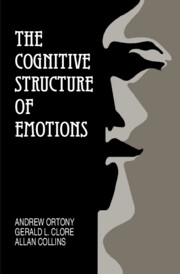Book contents
- Frontmatter
- Contents
- Preface
- 1 Introduction
- 2 The Structure of the Theory
- 3 The Cognitive Psychology of Appraisal
- 4 Factors Affecting the Intensity of Emotions
- 5 Reactions to Events: I
- 6 Reactions to Events: II
- 7 Reactions to Agents
- 8 Reactions to Objects
- 9 The Boundaries of the Theory
- References
- Author Index
- Subject Index
7 - Reactions to Agents
Published online by Cambridge University Press: 01 June 2011
- Frontmatter
- Contents
- Preface
- 1 Introduction
- 2 The Structure of the Theory
- 3 The Cognitive Psychology of Appraisal
- 4 Factors Affecting the Intensity of Emotions
- 5 Reactions to Events: I
- 6 Reactions to Events: II
- 7 Reactions to Agents
- 8 Reactions to Objects
- 9 The Boundaries of the Theory
- References
- Author Index
- Subject Index
Summary
The last two chapters dealt with emotions that result from reactions to desirable or undesirable events. However, there are also important qualitative differences among emotions that depend on how we believe salient events to have come about. When we consider this question, we focus on an agent whom we take to have been instrumental in the event, rather than on the event itself, although, as we shall see in the section on Compound emotions in this chapter, sometimes emotions result from focusing on both simultaneously. Just as the central variable for the Event-based emotions is the desirability of the event computed in terms of its goal relevance, so in the case of the Attribution emotions the central variable is praiseworthiness (which, in its technical sense, we take as including blameworthiness) computed in terms of the standards that are invoked in evaluating the agent's action. From an adaptive standpoint, focusing on an agent's actions may be important because, particularly in the case of undesirable events, it raises the possibility of controlling and being prepared for similar events in the future.
The Attribution Emotions
The situations in which people find themselves or in which they find others are frequently viewed as resulting from actions of one sort or another. Responsibility for these actions is often attributed to an agent. Thus, the Agent-based emotions are Attribution-of-responsibility or, simply, the Attribution emotions.
Information
- Type
- Chapter
- Information
- The Cognitive Structure of Emotions , pp. 134 - 155Publisher: Cambridge University PressPrint publication year: 1988
Accessibility standard: Unknown
Why this information is here
This section outlines the accessibility features of this content - including support for screen readers, full keyboard navigation and high-contrast display options. This may not be relevant for you.Accessibility Information
- 1
- Cited by
